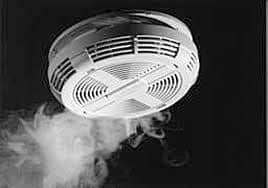Anger as firefighters forced to install alarms in Scotland which flout new safety law due to supply crisis
and live on Freeview channel 276
The Scottish Fire and Rescue Service (SFRS) said the number of interlinked detection systems available to it has “fallen below required levels”, with one senior officer warning the global shortfall of microchips was having a significant impact on availability of the devices, which became mandatory across every home in Scotland this month.
As a result, it is having to install battery-powered alarms in high-risk properties during what the officer described as a “difficult” situation.
Advertisement
Hide AdAdvertisement
Hide AdThe supply crisis is also forcing the SFRS to pay three times as much to source the in-demand alarms from elsewhere, prompting warnings that more funding will be needed on top of the £1 million the Government has provided the service so far via its home fire safety visit programme
The Government said it was in regular contact with the SFRS and that it was “aware of the challenges”.
However, Scottish Labour said the “astonishing revelation” revealed the “total chaos” of the new standards, with the fire service unable to meet the safety standards introduced by the SNP.
The Scottish Liberal Democrats said the Government had left the SFRS “up a creek without a paddle”, and warned its failure may jeopardise lives.


Advertisement
Hide AdAdvertisement
Hide AdThe introduction of the new standards has been the subject of widespread criticism, with long-standing warnings that it was being rushed in too soon.
Since it came into force, many homeowners have been unable to source the new alarm systems, with some in the SFRS warning staff were struggling to go about their day job due to fielding an “unprecedented” number of calls from members of the public asking about the new systems.
But the fact the SFRS itself is encountering supply issues with the interlinked alarms represents the gravest crisis facing the rollout to date.
Alasdair Perry, head of prevention and protection at the SFRS, said: “Due to global supply chain issues, the number of linked heat and smoke detectors available to our service has fallen below required levels. However, we are working to identify and procure additional detectors through alternative routes as a priority.


Advertisement
Hide AdAdvertisement
Hide Ad“If we go to any property that has no detection, we will carry out a full home fire safety visit, provide battery-operated, stand-alone smoke detection, and also ensure to advise the occupant about the new standard for the fire and smoke alarms required by the legislation in all Scottish homes.”
Last week, James Robertson, a SFRS station manager, told a West Lothian Council committee it was struggling to find interlinked alarms, and that even he was still looking to buy a system for his own house.
He explained there was only “very limited stock” of the interlinked devices, adding: “Our normal source where over the past few years we have purchased alarms from, they do not have supply. We have placed an order with another company, but unfortunately, due to supply and demand, those alarm systems are three times the price of the ones that we were buying originally, so that funding will not go as far as we would have expected it to go.”
Mr Robertson told councillors: “Hopefully within the next few weeks we’ll have further stock, but again, that stock will be limited, and once that’s gone, that will depend on the Scottish Government whether it’s going to put something else in place to provide more funding.”
Advertisement
Hide AdAdvertisement
Hide AdMeanwhile, David McCarrey, an SFRS area commander across Inverclyde, Renfrewshire and East Renfrewshire, said a deluge of telephone calls from homeowners was adding significantly to his staff’s workload.
He told a recent meeting of Inverclyde Council’s police and fire scrutiny committee: “The demand with calls has been unprecedented. Station personnel are struggling to maintain their operational readiness and get any meaningful time to train.”
Scottish Labour’s housing spokesman Mark Griffin said: “This astonishing revelation exposes what a shambles the SNP have created.
“It is a sign of total chaos that the fire brigade can’t meet the fire safety standards the SNP have dropped on us all, with minimal preparation or support.
Advertisement
Hide AdAdvertisement
Hide Ad“The SNP have completely botched these changes and missed an opportunity to improve safety in our homes. They urgently need to deal with these supply issues, so that everyone can comply with these laws.”
Tory shadow housing secretary Miles Briggs said: “This is yet further stark evidence of how shambolic this rollout has been. SNP ministers refused to listen to concerns, yet now the worst sort of fears over how it is actually working in practice are being realised.
“It is truly shocking that the fire service are having to shell out such high costs for these devices and are already running low on what funding they were given.
“Ministers must urgently outline what further funding will be given to our fire service and once again look at suspending this rollout.”
Advertisement
Hide AdAdvertisement
Hide AdPaul McGarry, housing spokesman for the Scottish Liberal Democrats, said: “The Scottish Government has left the Scottish Fire and Rescue Service up a creek without a paddle.
"This rollout will be remembered as one of the worst rollouts ever conducted. From the lack of support to homeowners to the seemingly non-existent communication to the public, everything about it has been nothing but abysmal.
"Fire and carbon monoxide systems save many lives each year, so the Scottish Government's failure may put lives at risk.”
A spokesman for the Scottish Government said: ”Officials are in regular contact with SFRS colleagues and aware of the challenges with the supply of alarms from some manufacturers who are reliant on imported components.
Advertisement
Hide AdAdvertisement
Hide Ad“Whilst home owners are encouraged to install interlinked alarms at the earliest opportunity, the legislation provides flexibility for work to be completed within a reasonable period, taking into account individual circumstances.”
A message from the editor:
Thank you for reading this article. We're more reliant on your support than ever as the shift in consumer habits brought about by coronavirus impacts our advertisers. If you haven't already please consider supporting our trusted, fact-checked journalism by taking out a digital subscription.
Comment Guidelines
National World encourages reader discussion on our stories. User feedback, insights and back-and-forth exchanges add a rich layer of context to reporting. Please review our Community Guidelines before commenting.
